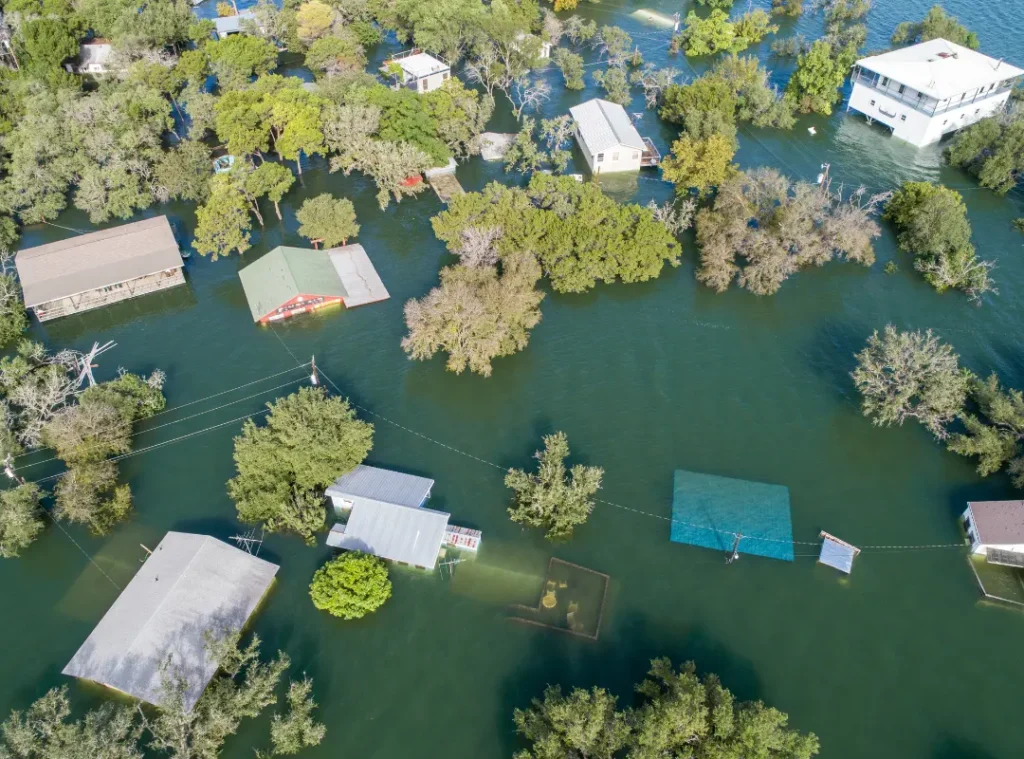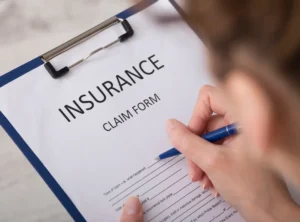Florida homeowners face a unique challenge after every major storm or hurricane: determining whether the damage was caused by wind or flood. This matters more than most people realize.
Why? Because your insurer treats wind vs flood damage insurance in Florida very differently — and choosing the wrong claim type (or not documenting the difference clearly) can lead to delays, denials, or underpaid claims.
Florida’s climate, hurricane paths, and low-elevation coastal terrain make insurance coverage especially complex. Homes in Tampa, Miami, Orlando, Fort Myers, Jacksonville, Palm Beach, and surrounding coastal areas are exposed to intense wind gusts, wind-driven rain, tidal surge, and flooding — often all at the same time.
Understanding the difference between wind or flood damage is critical for filing the correct claim and securing a fair settlement. This guide explains how insurers decide what caused the damage, the key coverage differences between homeowners’ insurance and flood insurance, and how a public adjuster for hurricane claims in Florida helps homeowners avoid costly claim mistakes.

Wind damage is typically covered by homeowners’ insurance in Florida, while flood damage requires a separate flood insurance policy (FEMA/NFIP or private). After a storm, insurers investigate roof damage, structural pressure, waterlines, debris patterns, and entry points to determine the cause. Misclassification is common — and often leads to reduced payouts — so documentation and expert review are essential.

How Insurers Determine Wind vs. Flood Damage in Florida
Florida insurers use specific criteria to decide whether damage was caused by wind or water. This distinction directly influences your payout — especially after hurricanes where both occur simultaneously.
Below are the factors insurers analyze when assessing wind or flood damage in Florida:

1. How Wind Damage Is Identified (Covered by Homeowners Insurance)
Wind damage occurs when high-speed hurricane winds or wind-driven debris strike the structure. Common wind indicators include:
Structural Damage Pattern
- Missing shingles or tiles
- Lifted roof decking
- Torn flashing
- Impact marks from flying debris
- Siding peeled away on the wind-facing side
- Broken windows from wind pressure, not rising water
Exterior Evidence
- Trees or branches fallen onto the property
- Detached soffits and gutters
- Missing fences or screens
Interior Evidence
- Water intrusion from roof penetrations
- Wet insulation
- Staining below attic decking
- Water following vertical paths (not horizontal floor-level damage)
Wind Damage Insurance Claim Florida Coverage
Standard homeowners’ policies typically cover:
- Roof damage
- Window damage
- Exterior structural impact
- Interior rain damage if wind compromised the structure first
If you live in Miami-Dade, Broward, Hillsborough, Lee, or Pinellas County, you may also have mandatory hurricane deductibles, which apply only when wind is the primary cause.

2. How Flood Damage Is Identified (NOT Covered by Homeowners Insurance)
Flood damage occurs when rising water from outside enters the property — usually from storm surge, overflowing canals, clogged drains, or flash flooding.
Common Indicators Insurers Look For
- Mud or silt residue inside the home
- Uniform high-water marks or waterlines
- Damage beginning at floor level and rising upward
- Swollen baseboards, cabinetry, and flooring
- Water that enters without structural compromise
Flood Insurance Claim Florida Coverage
Flood damage is not covered by homeowners’ insurance. You must have:
- NFIP/FEMA flood insurance, or
- Private flood insurance, which is increasingly common in Florida
Flood insurance generally covers:
- Structural damage
- Electrical and HVAC systems
- Flooring and walls
- Foundation damage
- Built-in appliances
If you live near coastal areas like Naples, Fort Myers Beach, Palm Coast, Daytona, Key Largo, or the Panhandle, flood insurance is critical — especially for storm surge.

Wind vs. Flood Damage in Florida: Why It’s So Confusing
After a hurricane, many Florida homes suffer both wind AND flood damage, sometimes within minutes. This leads to:
- Disputes between insurers
- Delays in claim approval
- Underpaid or denied claims
- Confusion about which policy applies
Insurers sometimes classify damage as “flood” even when wind played a role — because flood claims shift responsibility away from the homeowner’s insurer.
This is one of the top reasons Florida homeowners hire a public adjuster for hurricane claims. They document the cause of loss accurately and ensure insurers don’t mislabel wind damage as flood damage.

Key Differences Between Wind and Flood Insurance Coverage
Below is a simple comparison to help Florida homeowners understand the distinction clearly.
Wind Damage (Homeowners Insurance)
Typically covers:
- Roof damage
- Wind-driven rain
- Broken windows
- Exterior damage from wind gusts
- Debris impact
Flood Damage (Flood Insurance Policy)
Covers:
- Rising water from outside
- Storm surge
- Overflowing rivers, lakes, or canals
- Groundwater intrusion
- High-water marks & mud debris
Mixed Damage Example
A hurricane blows shingles off your roof → rain enters → wind claim
A storm surge pushes water into your home → flood claim
Both happen → two separate claims apply

The Role of Public Adjusters in Storm Damage Insurance Claims in Florida
Public adjusters protect homeowners against underpayments, delays, and misclassification — especially after hurricanes.
What a Public Adjuster Does
- Conducts independent inspections
- Documents damage with photos, moisture mapping, and reports
- Identifies wind vs. flood patterns
- Challenges insurer decisions
- Prepares full claim packages
- Negotiates the highest possible payout
When to Call a Public Adjuster
- Your insurer is blaming flood damage when wind is clearly involved
- You received a low or partial estimate
- The damage is complex or widespread
- You need help understanding your policies
- You want a second opinion before accepting a settlement
For Florida homeowners dealing with hurricane, water, wind, mold, roof, or structural damage, hiring a public adjuster often leads to significantly higher settlements.

Common Mistakes Florida Homeowners Make After a Storm
Mistake #1: Filing the Wrong Type of Claim
Submitting a flood claim for wind-caused interior water damage can result in denials.
Mistake #2: Cleaning Up Too Soon
Removing debris or replacing damaged material before documentation weakens your claim.
Mistake #3: Trusting the First Insurance Estimate
Many first estimates are incomplete — especially after large hurricanes when insurers feel pressure.
Mistake #4: Assuming “Water Damage” Is Always Flood Damage
Wind-driven rain ≠ flood damage. This misclassification is extremely common.
Mistake #5: Not Calling a Public Adjuster Early
The earlier you involve a professional, the more accurately damage is documented and negotiating power you maintain.

Frequently Asked Questions (FAQ)
1. Does homeowners’ insurance in Florida cover wind damage?
Yes. Wind damage is generally covered — especially when caused by hurricanes or strong storms — though hurricane deductibles may apply.
2. Is flood damage covered by homeowners’ insurance?
No. Flood damage requires a separate flood insurance policy (NFIP or private).
3. How do insurers determine if damage is wind or flood?
They examine roof failures, waterlines, debris patterns, structural pressure, and points of water entry.
4. Can a public adjuster help if my insurance claim is denied?
Absolutely. Public adjusters often reopen denied or underpaid claims and negotiate higher settlements.
5. What if my home has both wind and flood damage?
You may need to file two separate claims — one under homeowners’ insurance and one under your flood policy. Documentation is crucial.
6. When should I call a public adjuster?
Immediately after discovering damage. Early documentation can prevent misclassification and protect your payout.

If your Florida home suffered wind or flood damage — or you are unsure which policy applies — you do not have to navigate the insurance process alone.
A licensed public adjuster can help you:
- Accurately determine the cause of damage
- File the correct type of claim
- Challenge low or denied estimates
- Maximize your hurricane, storm, wind, or flood insurance payout
If your Florida home was damaged by wind, flooding, or a combination of both, The HomeOwner’s Advocate is here to protect you. Our licensed public adjusters specialize in hurricane, storm, water, mold, roof, and structural damage claims — and we fight to ensure homeowners receive the full, fair settlement they deserve.
Before you accept the insurance company’s estimate, talk to us first.
We offer free claim reviews, second opinions, and complete claim handling for homeowners across Florida.
Contact The HomeOwner’s Advocate Today
📞 800-FAIR-CLAIM
🔗 Schedule a Free Claim Assessment
🌐 Visit: thehomeownersadvocate.com
Get expert help. Get a fair claim. Get The HomeOwner’s Advocate on your side.








